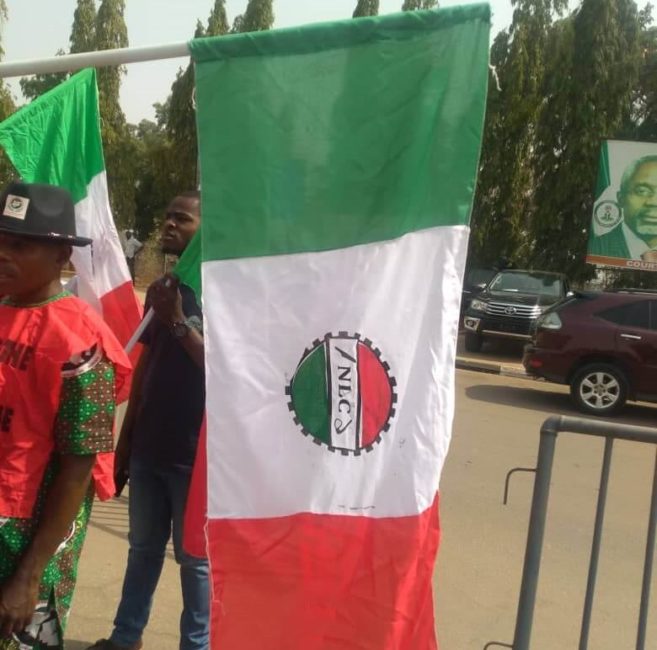The Federal Government has come under pressure as restive workers’ unions rev up agitations over living conditions.If You’re Reading From Phoenix Click On Read Original To Read Full Article
Among the labour unions that have recently been at daggers drawn with the government are the Academic Staff Union of Universities (ASUU), National Union of Petroleum and Natural Gas Workers (NUPENG), in collaboration with the Trade Union Congress (TUC).
Resident doctors under the National Association of Resident Doctors (NARD) just called off their indefinite strike.
Already, the nation’s ivory towers are under very tense atmosphere as the Academic Staff Union of Universities (ASUU) has threatened to begin indefinite strike on Monday.
Also, the Non-Academic Staff Union of Educational and Associated Institutions (NASU) and the Senior Staff Association of Nigerian Universities (SSANU) have given the Federal Government seven days to address outstanding demands, or face an indefinite strike.
Parents and students are jittery as they fear that if nothing concrete and positive is done by the stakeholders, especially the Federal Government, activities in higher institutions will ground to a halt from tomorrow, Monday, September 22.
Sunday Investigation, however, shows that most of the strikes and threats of strike are due to several unfulfilled agreements between the Federal Government and the trade unions over salaries and workers’ welfare.
Unionists insist that Nigerian workers are hungry and angry and that their adrenaline can no longer take it in the face of ostentatious living by public officials and political leaders.
The Nigerian workers and the masses are now weighed down by the hardship occasioned by the economic situation in the country and might have resolved to take their destiny in their own hands.
The Nigerian workers, who have been bearing the effects of the various reforms put in place by the President Bola Tinubu administration no longer wish to take things lying low.
NARD ON FULL-BLOWN ACTION
For instance, the National Association of Resident Doctors (NARD) members, which recently embarked on a five-day nationwide warning strike, has started a full-blown industrial action.
NARD, in a communiqué issued on September 1, 2025, signed by the President, Osundara; General Secretary, Dr. Oluwasola Odunbaku; and Publicity and Social Secretary, Dr. Omoha Amobi, demanded immediate payment of the outstanding 2025 Medical Residency Training Fund, settlement of five months’ arrears from the 25–35 per cent Consolidated Medical Salary Structure review, and other long-standing salary backlogs demands.
Others are the payment of the 2024 accoutrement allowance arrears, prompt disbursement of specialist allowances, and restoration of the recognition of the West African postgraduate membership certificates.
However, the Federal Capital Territory (FCT) chapter of the National Association of Resident Doctors (NARD) has suspended its indefinite strike following intervention by the Senate Committee on Federal Territory Area Councils and Ancillary Matters.
The president of the chapter, George Ebong, who disclosed this, said that his members were expected to resume work on Monday, September 22, 2025, at 8.am.
Ebong, however, revealed that none of the demands of the association had been met yet.
ASUU AND EDUCATION
The cases of ASUU and the other unions in the educational sector are curious as some of the issues have been lingering over several years, dating as far back as 2009.
It would be recalled that in 2009 the Federal Government and the unions in the educational sector reached several agreements, which surprisingly and curiously, had remained unfulfilled despite several protracted industrial actions, which sometimes took several months to resolve, thereby destroying students’ academic programmes.
Yet, successive administrations could not resolve these issues, even when some of the agreements were reportedly reviewed.
Curiously, an agreement ASUU reportedly reached with the Federal Government during the last strike when Professor Emmanuel Osudeke was in charge of the union, was said not to have been signed, hence the issues have continued to linger.
ASUU accused President Tinubu’s administration of neglecting the union’s long-standing demands, despite several rounds of negotiations.
The unresolved issues include full implementation of the 2009 ASUU-FGN Agreement, improved funding for universities, revitalisation of infrastructure, outstanding salary arrears, stagnated promotions, unremitted deductions, and the alleged victimisation of lecturers in some institutions.
ASUU raised key demands, including the renegotiation of the 2009 ASUU-FGN Agreement, sustainable funding and revitalisation of universities, payment of outstanding 25–35% salary arrears, promotion arrears spanning over four years, and unresolved third-party deductions.
According to an ASUU source, “The government promised action on these issues, yet, here we are, several years later, with no resolution.”
The issues are yet to be settled as both parties resolved to return once more for re-negotiation, following hints that the president was determined to end the trend of strikes in the academic sector.
TENSION IN THE OILY SECTOR
In the oil and gas sector, the situation has not really been easy as the critical stakeholders have also been grumbling.
Just few days ago, the strike threat by the National Union of Petroleum and Natural Gas Workers (NUPENG), in collaboration of the Trade Union Congress (TUC), as a result of a face-off with Dangote Refinery, was suspended following the intervention of the Department of State Service (DSS), which felt that crisis in the sector may affect national security.
The face-off between NUPENG and Dangote Refinery centred on the right of workers to unionise, as guaranteed by labour laws, even as the union accused the company of trying to foist a monopoly on the populace.
Speaking on the current workers’ crises, Barrister Olalekan Festus Ojo, a Lagos-based human rights lawyer, said that from a legal-constitutional perspective, the right of workers to embark on strike is clearly protected under the 1999 Constitution (as amended) and reinforced by the Labour laws in Nigeria.
Ojo stated: “Section 40 guarantees freedom of association, which includes the right to form and belong to trade unions for the protection of collective interests.
“Thus, when unions like NUPENG, TUC, or resident doctors threaten or proceed on strike, they are exercising a constitutionally recognised instrument of bargaining.
“However, the Constitution also imposes a duty on the government to ensure that socio-economic rights such as access to healthcare, fair wages and safe working conditions are progressively realised.
“Persistent strikes are, therefore, symptomatic of state failure to uphold its obligations under both the Constitution and international labour conventions ratified by Nigeria, particularly those of the International Labour Organisation (ILO).
“That said, the legality of a strike is subject to due process: proper notice, exhaustion of negotiation mechanisms, and compliance with essential services restrictions.
“Strikes in critical sectors like health and petroleum require special balancing, as prolonged action could infringe on citizens’ fundamental rights to life, dignity, and movement.
“In essence, the grievances are constitutionally grounded, but sustainable resolution demands institutionalised adherence to collective bargaining and judicially enforceable agreements.”
FIGHT AGAINST EXPLOITATION
Baba Aye, a veteran activist and one-time executive of the Nigerian labour Congress (NLC), while speaking with Sunday Independent, stated that the current wave of strikes brings Mao Tse Tung’s words to mind: ‘There is great chaos under heaven, hence the situation is excellent’.
According to him, “If there were no chaos of strikes, it would mean that working-class people in Nigeria have accepted and fully internalised their enslavement.
“The strikes and ultimatums have different demands, but they are all manifestations of resistance.
“They are unions fighting back against exploitation and oppression of workers by the capitalists and capitalist government.
“One of the things that also comes out sharply is the insincerity of the government and its inability to be proactive because of its disdain for workers and their unions.
“Look at the NUPENG strike, for example. They waited until it started before initiating a conciliation process. This is not accidental. It is the norm.
“In addition, the NARD strike shows us that you just can’t trust these oppressors in power.
“I remember they went on strike in January, but it was called off based on promises by Mr. Nyesom Wike, the FCT Minister. Some of us knew then that these were no more than empty promises.
“I welcome the TUC’s stance against the fuel tax. This is something that concerns us all. There should be joint mass mobilisation around the demand against it, bringing together the NLC, TUC, FIWON (Federation of Informal Sector Workers of Nigeria) and civil society organisations.”
WIDENING SOCIAL FRACTURE
Dr Bolaji O. Akinyemi, Convener of the Apostolic Round Table (ART), maintained that the strikes by NUPENG, TUC, and Abuja resident doctors reflect Nigeria’s widening social fracture.
Akinyemi, while speaking with Sunday Independent, stated: “Workers demand survival: fair wages, union rights, decent hospitals, and relief from arbitrary taxes.
“Their anger is legitimate when we recall that in 2023 the Revenue Mobilisation Commission proposed a 114% pay rise for the president, governors, legislators, and judges—while ordinary workers were left to swallow inflation, fuel price shocks, and unpaid arrears.
“Lawmakers already earn among the highest globally, yet nurses flee abroad, doctors beg for equipment, and unions are threatened for organising.
“The contrast is obscene: those who create wealth and keep society running are starved, while those who consume it are rewarded.
“Revenue Mobilisation Commission by its 114% pay review for the president, governors, legislators, and judges has presented the percentage at wages should be reviewed across the board for all Citizens.
“If the government continues to raise privileges at the top while ignoring workers’ cries below, strikes will multiply—and with them, the risk of workers’ revolution.”
Kunle Wizeman Ajayi, the General Secretary of United Action for Democracy (UAD), during an interaction with Sunday Independent, stated that workers have been badly treated and cheated by the TInubu regime.
Ajayi, the immediate-past National Coordinator, Socialist Workers’ League (SWL), said: “They (workers) are not only disappointed, but are afraid of even continuing work under the impunity of this hegemony.
“NUPENG has won a major unionisation battle against the anti-worker Dangote Petroleum, and it is an excellent victory.
“The NUPENG victory will inspire federal workers to rise and demand for better pay. It will spur ASUU on, and also the resident doctors.
“Workers’ pay cannot even take care of their transportation. Yet, politicians cash out billions of Naira from the same commonwealth grown by workers.
“This capitalist wickedness has to stop. And NUPENG has shown how it is done. I urge all workers to take a strong cue from NUPENG. Victoria Ascerta!”
GROUPS IN SOLIDARITY
Meanwhile, the Workers’ Rights Campaign (WRC) has said that it stands in full solidarity with the Association of Resident Doctors (ARD) in the Federal Capital Territory (FCT) who recently embarked on a five-day warning strike and later declared full-blown indefinite strike before it was called off following the Senate intervention.
The WRC, which said the NARD strike was crucial, in a statement signed by Kelvin Ayemhenre, its National Secretary, and made available to Sunday Independent, said: “We understand that your decision to embark on this action is rooted in the unjust and undignified way with which issues concerning resident doctors and healthcare delivery have been treated by the FCT administration.
“We condemn the government’s failure to meet the demands of your association despite numerous warnings, and your calling off an earlier strike in January with the belief that government would do the need.
“Persistent inaction on the part of the government, regarding your legitimate demands shows their disinterest in not only the welfare of doctors, but also in the life and health of Nigerians.
“We also must say that we indeed appreciate the bold step that you have taken not just for yourselves, but for all Nigerians, because health care is a matter of serious concern to each and every one of us, most especially the public health care system.
“We acknowledge the sacrifices healthcare workers make, often under life-threatening conditions, and urge the government to prioritise improving the standard of facilities in our public hospitals in the interest of all healthcare workers, and patients.”
Observers are worried that if the Federal Government fails to end these strikes and threats to strike early enough, civil society groups and student unions may embark on sympathy protests and this could provoke social disorder and significant economic losses.





